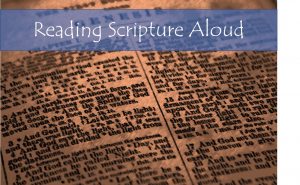
“This was now the third time that Jesus appeared to the disciples…”
This excerpt from a passage from the John 21: 1-19 is included in the revised common lectionary provided by the Vanderbilt Divinity Library. The text is from the NRSV.
You can hear a recording of this passage here.
Reading the Gospel aloud invites the audience to experience human encounters with the divine as revealed in the Bible. We may leave interpretation and meaning to members of the clergy and other scholars. What we’re most interested in as lay readers is the human experience found in the narrative.
First Impressions
How do we make sense of the narrative we are reading? What is it that impresses you most as you read through this passage for the first time?
The reading has two distinct parts. Each has a very different feeling and is mysterious in its own way. Each involves repetition three times.
The first encounter is between the disciples in a fishing boat and Jesus standing on the beach. The encounter is public and is offered as evidence of the third time that Jesus appears to the disciples.
The water creates a distance between them. But Jesus is able to bridge the distance between the disciple’s boat and the beach. Jesus prepares a meal and offers them food to eat. The feeling is familial and yet mysterious at the same time. The disciples don’t recognize Jesus right away.
The second part is more intimate and seems almost dream-like. Again, the number three factors largely. Jesus asks Peter three times, “Do you love me?” And three times Jesus asks Peter to tend to his flock.
The Number 3
The number three seems to serve as proofs and tests at the same time.
Peter is the protagonist in these passages. His behavior is striking. There are two sentences which seem anomalous.
- “When Simon Peter heard that it was the Lord, he put on some clothes, for he was naked, and jumped into the lake.”
- “(He said this to indicate the kind of death by which he would glorify God.)”
The first sentence above recounts somewhat strange behavior on the part of Peter. He puts on some clothes and jumps into the lake about 100 yards off shore. The second parenthetical sentence almost feels as if it was added later. Running commentary on meaning and intention in the Gospels is rare. Both seem to indicate that Peter’s experience is profoundly moving and a little confusing.
The disciples know its Jesus but are afraid (dare not) say so. Peter seems to acknowledge that it’s Jesus in calling him “Lord.” But Peter is hurt by what Jesus is saying to him. Why does he test him three times? Does Jesus doubt Peter’s love for him?
It is noteworthy that Jesus invites Peter rather than commands him to “Follow me.” Not worship me. Not obey me. But simply follow me.
Text Analysis
These are key words that provide some direction for reading the passage out loud.
Jesus “shows” or reveals himself to the disciples in unusual ways. Why do they not recognize him immediately?
The first part of the reading is very particular account of events. The names of the disciples who are present are all given in full as if submitted in evidence.
The number three recurs in both parts. Three is a powerful number. One is random. Two are a coincidence. But three proofs are unassailable.
Jesus refers to them as “children” and to his followers as his “sheep.” They are innocents but now in the world without a shepherd.
The word love recurs, but Jesus might just as well ask Peter, “Do you trust me?” Peter responds, “You know I do?”
These passages are both invitations to “follow” Jesus.
These are words that color the reading.
Reading this passage aloud
The passages require a change in voice from the first to the second parts. The first is filled with familiar voices calling to one another. The scene is realistic. The evidence is detailed and laid out carefully. The second is more intimate and dream-like. Jesus speak cryptically and repeats himself. Peter’s response to both is emotional.
The first part is narrative, the second part is dialogue. The evidence offered in the first part should be very clearly stated. No detail should be missed. We want to experience the narrative and but remember the conversation. Peter is hurt by his conversation with Jesus. Jesus seems to doubt him. We can hear the hurt in Peter’s voice. But he will not forget this conversation.
What do you hear in this passage?

